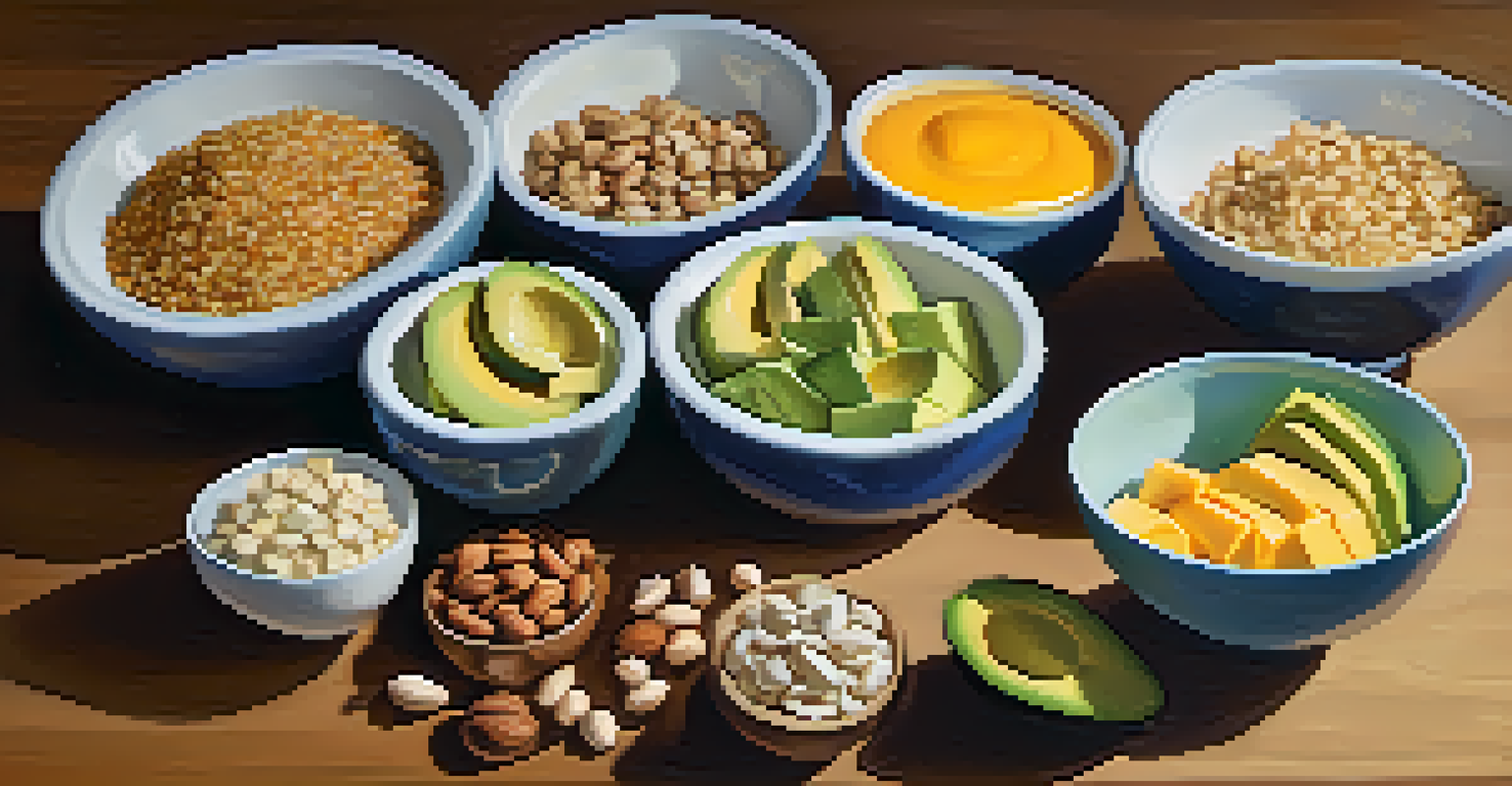Understanding Macronutrients: Muscle Retention on Diets

What Are Macronutrients and Why Do They Matter?
Macronutrients, which include proteins, fats, and carbohydrates, are essential for our bodies. They provide the energy we need to function throughout the day and support various bodily functions. Understanding how each macronutrient contributes to overall health is crucial, especially for those looking to retain muscle while dieting.
You are what you eat, so don't be fast, cheap, easy, or fake.
For instance, protein is often hailed as the building block of muscle. It helps repair and build muscle tissues after workouts, which is vital when you're in a calorie deficit. On the other hand, fats are necessary for hormone production and the absorption of certain vitamins, while carbohydrates provide quick energy, particularly during intense exercise.
By balancing these macronutrients effectively, you not only fuel your workouts but also support muscle retention, which can be a common concern during weight loss. Knowing the right amounts of each can make a significant difference in your fitness journey.
The Role of Protein in Muscle Retention
Protein is often the star player when it comes to muscle retention, especially during dieting. Consuming adequate amounts of protein helps prevent muscle breakdown, which can occur when your body is in a calorie deficit. It's like having a safety net that ensures your hard-earned muscle doesn’t disappear.

For example, if you're following a weight-loss diet, aim to include a source of protein in every meal. Lean meats, fish, eggs, beans, and dairy are all excellent options. Studies suggest that around 1.6 to 2.2 grams of protein per kilogram of body weight can be optimal for muscle preservation while dieting.
Importance of Macronutrients
Macronutrients, including proteins, fats, and carbohydrates, are essential for energy and muscle retention, especially during dieting.
Incorporating protein-rich snacks, such as Greek yogurt or a handful of nuts, can also be beneficial. This not only helps keep you satiated but reinforces your muscle retention efforts, allowing you to maintain your strength and physique.
Understanding Carbohydrates: The Energy Source
Carbohydrates often get a bad rap in the dieting world, but they are crucial for maintaining energy levels, especially during workouts. They serve as the primary energy source for high-intensity exercises, making them essential for anyone looking to preserve muscle while losing fat. Think of carbs as fuel for your engine.
The only bad workout is the one that didn't happen.
When you're in a calorie deficit, your body may tap into muscle for energy if it doesn't have enough carbs. This is why it's important to include enough carbs in your diet, particularly around your workout times. Foods like whole grains, fruits, and vegetables not only provide energy but also offer vital nutrients.
Balancing your carb intake can help you feel energized and ready to hit the gym. By timing your carb consumption correctly, you can enhance your performance and protect your muscle mass during your weight loss journey.
Fats: The Unsung Hero in Muscle Preservation
Fats are often overlooked, but they play a crucial role in overall health and muscle retention. Healthy fats, such as those found in avocados, nuts, and olive oil, are essential for hormone production, including hormones like testosterone, which is vital for muscle growth and repair.
Incorporating healthy fats into your diet can also improve your overall satiety, helping you feel full longer. This can be particularly helpful when you're trying to manage cravings while dieting. Think of fats as the glue that holds everything together in your nutrition plan.
Role of Protein in Muscle Retention
Adequate protein intake serves as a safety net against muscle breakdown during calorie deficits, making it crucial for preserving muscle mass.
Aim for a balanced approach by including a variety of fats in your meals. This not only supports muscle retention but also contributes to better overall health, making your dieting journey more sustainable and enjoyable.
Caloric Deficit: Finding the Right Balance
Creating a caloric deficit is essential for weight loss, but doing so while preserving muscle requires careful planning. A deficit that's too large can lead to muscle loss, so it's important to find a balance that works for you. Think of it as walking a tightrope where you want to stay steady without tipping over.
Typically, a moderate deficit of 500 to 750 calories per day is recommended for safe and sustainable weight loss. This allows your body to burn fat while still having enough energy to maintain muscle. Tracking your intake can help ensure you stay within this range without sacrificing nutrition.
Remember, the goal is not just to lose weight but to lose fat while keeping muscle intact. By monitoring your caloric intake and focusing on nutrient-dense foods, you can achieve this balance and enjoy the process.
The Importance of Resistance Training
While nutrition plays a significant role in muscle retention, resistance training is equally important. Engaging in regular strength training helps signal your body to maintain muscle mass, even when you're in a calorie deficit. It's like sending a message that says, 'Hey, we need this muscle!'
Aim for at least two to three sessions of weight training per week, targeting all major muscle groups. This can include activities like lifting weights, doing bodyweight exercises, or even using resistance bands. The key is to challenge your muscles, promoting growth and retention.
Resistance Training Matters
Incorporating regular resistance training signals the body to maintain muscle mass, complementing a balanced diet for optimal results.
Combining strength training with a balanced diet rich in macronutrients can significantly enhance your results. This dynamic duo will not only help you lose weight but also ensure you do it while keeping your muscle mass intact.
Monitoring Progress and Making Adjustments
Tracking your progress is essential to ensure you're on the right path towards muscle retention while dieting. Regularly assessing your body composition, strength levels, and energy can provide valuable insights into how your body is responding to your diet and exercise regimen. It's like checking the compass to ensure you're headed in the right direction.
If you notice muscle loss or decreased performance, it may be time to adjust your caloric intake or macronutrient balance. Sometimes, simply increasing your protein intake or adjusting your workout routine can make a significant difference. Staying flexible and open to change is key.

Remember, everyone's body responds differently, so it's important to listen to yours. By monitoring your progress and making necessary adjustments, you can fine-tune your approach to achieve your goals more effectively.